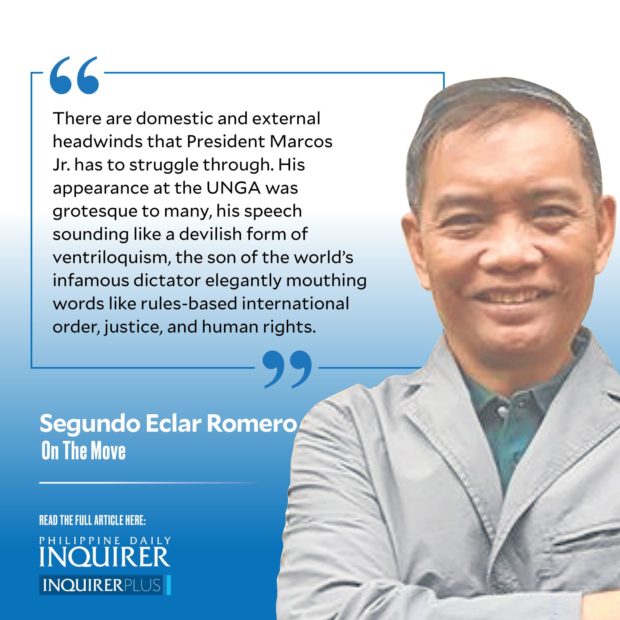The trips of President Marcos Jr. to Indonesia and Singapore, followed by his speech at the 77th UN General Assembly (UNGA) and meeting with President Joe Biden were brilliant coups.
There is nothing like a foreign trip to earn plaudits for a president. The world of diplomacy is eternally more tactful and gracious than local audiences. Even in the United States, where there was a sizeable group of Filipinos that opposed the return of the Marcoses to power, it was easy to drown them out with an audience of Filipino professionals and residents that was more welcoming to the President.
There were serendipitous junctures in the President’s trip. That he was scheduled to speak at the UN on Sept. 21 robbed the local protest movement of its primary target to commemorate the declaration of martial law in 1972.
The trip to Indonesia was a solid move, deflecting speculation away from the President’s revelation of his Big Power leanings—China, Russia, or the United States. Indonesia and Malaysia were historically the closest neighbors of the Philippines, all predominantly Malay states who, at one time, briefly formed Maphilindo, a forerunner of Asean.
Malaysia could not figure in the initial sortie of Mr. Marcos, perhaps in view of the sensitivity of the Malaysians to the uncanny parallelisms between the corruption and fall of former prime minister Najib Razak and his wife Rosmah Mansor and that of the Marcoses. A Marcos visit to Kuala Lumpur would have been risky PR-wise. The recent election of Mr. Marcos to the Philippine presidency was an acute reminder for Malaysians that they should steer their affairs to prevent a similar return of the Najibs to power in the future.
An additional potential irritant in Philippine-Malaysia relations is the recent award by a French arbitration court of close to $15 billion to the heirs of the Sultan of Sulu over the Sabah claim against Malaysia.
The recent salutary moves of Mr. Marcos are a reminder of a hitherto neglected factor—his outward performance of his role as President is patterned after the way Ferdinand Sr. played his role—cloaked with legality, profuse rhetorical appeal to the common good, visible command leadership, and use of tact and diplomacy even in the application of coercive measures.
In other words, Mr. Marcos is an apparent return to presidential normalcy, characterized by a norm of leadership and management behavior that trusts and relies on the professional bureaucracy and gives due course to its established processes, rather than imposing personal preferences and biases roughshod over the advice of the bureaucracy, as Rodrigo Duterte was wont to do during his presidency.
The meticulous and competent preparation for the trips to Indonesia, Singapore, the UNGA, and the incidental meeting with the US president at the UNGA sidelines were the painstaking work of the career and professional bureaucracy and many agencies, of which I would particularly mention the Department of Foreign Affairs.
This exemplary delivery by the bureaucracy helps to counter the initial chilling effect of the resignation of Leocadio Sebastian as agriculture undersecretary and the other SRA board members. This affair threatened to kill initiative among bureaucrats lest they also get the “Sebastian treatment.”
Mr. Marcos’ meetings with foreign officials, entrepreneurs, and Filipino communities in his visits established in thick broad strokes the foreign and domestic policies of the Philippines.
The meetings with overseas Filipinos harkened to the campaign style of Mr. Marcos in engaging the Filipino audience, which unfortunately ceased when he became president.
The visit to the UNGA enabled Mr. Marcos to meet with Biden and reestablish important keywords. The Marcos paean to the US as partner, ally, and friend of the Philippines looks like a resumption of the traditionally close relations between the two countries disrupted during the Duterte years. It helps that, obviously, the Marcoses just love New York.
Despite these laudatory signals, there are domestic and external headwinds that Mr. Marcos has to struggle through. His appearance at the UNGA was grotesque to many, his speech sounding like a devilish form of ventriloquism, the son of the world’s infamous dictator elegantly mouthing words like rules-based international order, justice, and human rights.
Mr. Marcos gave a mouthful of policy statements and prescriptions for governments. It is his task now to make a backward integration and ensure that his government dutifully honors these.
doyromero@gmail.com
